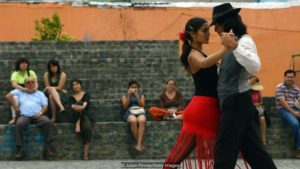
Influenced by foreign language, Buenos Aires’ lunfardo slang is representative of the citizens and the popular demeanour.
In the late 19th century, Argentinian police officers noticed that thieves were using a new language, with different words, to communicate with each other. Assuming it as a sort of criminal jargon, they called it “lunfardo”, meaning “thief” in Spanish.
But according Oscar Conde, an Argentinian professor and writer, “lunfardo is not related, really, with criminals, but it is with europeans immigration between 1880 and the beginning of World War l. During those years, four million people, mostly Italians and spaniards, arrived in Buenos Aires. Then, Italians words were adopted quickly into every speech”.
Spanish wordplay, especially “vesre”, a form of language modification in which the last syllable of a word is moved to the start, also contributed to the development of lunfardo.
Lunfardo spread through every conversation in Argentina, particularly in Buenos Aires. But it was the birth of Tango that cemented lunfardo’s role in Argentinian culture. Tango lyrics were filled with lunfardo.
Tango was the soundtrack of Buenos Aires, and lunfardo was at the heart of it. Tango lyrics contributed to the diffusion of the language, in turn, lunfardo gave Tango a tone and style.
It has been 100 years since Carlos Gardel, singer and songwriter, invented the iconic Tango that helped weave lunfardo in every conversation. But in Buenos Aires, the playfulness in language and the joy in music are very much alive and well.
http://www.bbc.com/travel/story/20171001-how-italians-influenced-a-south-american-dialect
Summary.
How italians influenced a south american dialect.
Influenced by foreign language, Buenos Aires’ lunfardo slang is representative of the citizens and the popular demeanour.
According the Argentinian writer and professor Oscar Conde, lunfardo is related with european immigration between 1880 and the beginning of World War l. During those years, four million people, mostly italians and spaniards, arrived in Buenos Aires. Then, italians words were accepted quickly into every speech. In the “conventillos”(a very big house where lived many families of immigrants and poore people), specially, Lunfardo began in a new way to communicate.
Spanish wordplay, “vesre”, a form of language in which the last syllable of a word is moved to the start, also contributed to the development of lunfardo. And it was the Tango music that cemented lunfardo’s role in Argentinian culture. Tango lyrics were filled with lunfardo. Tango was the soundtrack ok Buenos Aires, and lunfardo was the heart of it.
So if you want to visit Buenos Aires, stay ready to discover a new language, and use it!
Source: www.bbc.com





